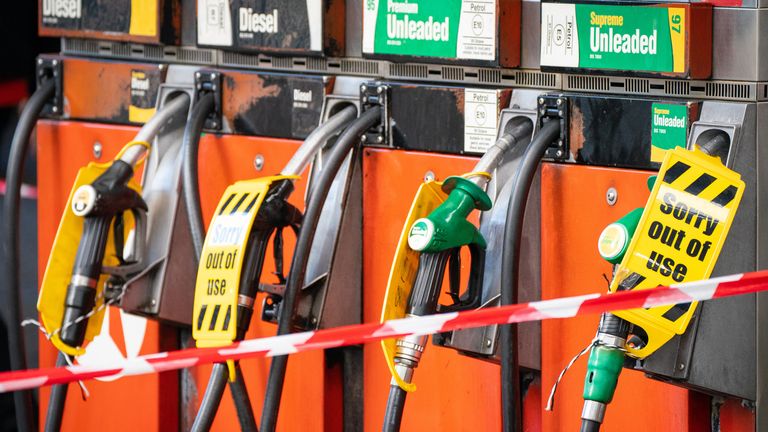‘Significant reduction’ in petrol stations running dry in hard-hit London and South East
The number of petrol stations running dry in London and the South East has seen a “significant reduction”, according to daily industry data.
In its latest update on the fuel crisis, the Petrol Retailers Association (PRA) said 15% of sites in the region – which is taking longer to return to normal than the rest of the country – were dry on Tuesday.
That was down from 20% reported by the PRA a day earlier.
It said the situation was improving in the region, with 64% of petrol stations having both grades of fuel available while 21% had only one grade.
Gordon Balmer, the PRA’s executive director, said: “Whilst there has been a significant reduction in dry sites, these areas are still lagging behind in having both grades of fuel available compared to the rest of the UK.”
Across the country, 86% of sites reported having both grades of fuel “thanks to steady deliveries and stabilising demand” while 3% reported having only one grade and 11% were dry, Mr Balmer said.
He added: “Members are reporting they are now receiving deliveries from military drivers using commercial tankers, however further action must be taken to address the needs of disproportionately affected areas.”
The PRA represents independent forecourts across the UK, which make up about two-thirds of the total.
In normal times 95%-100% of petrol stations would be expected to be open for business at any one time, save for anomalies such as weather conditions, power failures and protests.
The fuel crisis began more than a week ago when the news of closures at a small number of BP petrol stations, caused by an ongoing shortage of lorry drivers, sparked nationwide panic buying.
In response, the government said it would issue 5,000 temporary visas to allow more drivers into the country including 300 on an immediate basis, as well as enlisting help from military drivers.
It emerged on Tuesday that just 127 such visas had been issued so far – 100 for food hauliers and 27 for fuel tanker drivers.
Rod McKenzie, managing director of policy and public affairs at the Road Haulage Association, told the PA news agency: “There isn’t a database of lorry drivers with names attached to them and want to work in Britain that British lorry firms can tap into and say, ‘we’ll have that one, that one, that one or that one’.
“It doesn’t work like that, it doesn’t exist.”
The shortage of HGV drivers and other workers is causing problems across the economy – not just for petrol stations.
Bakery chain Greggs on Tuesday became the latest to reveal how it had been affected but pledged that “the sausage roll is safe”.
Last week, the head of fashion retailer Next warned that unless immigration rules were relaxed, the lack of foreign warehouse workers could hamper Christmas shopping deliveries.




